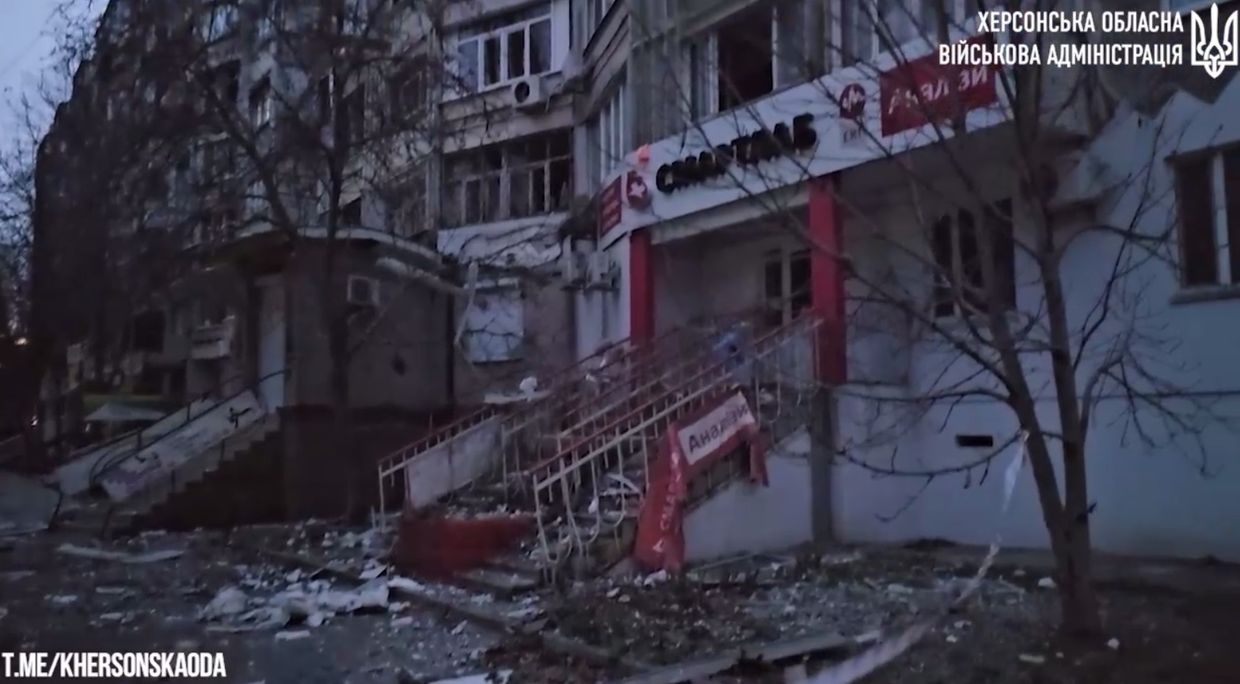Daily Flyer - December 4-5, 2023
A voice of Ukraine to the West

Russian attacks kill 3, injure 11 in Donetsk, Kherson oblasts over past day

The situation in Ukraine remains dire as Russia conducted attacks on 11 of Ukraine's oblasts in the past day, resulting in the tragic loss of at least three lives and injuries to at least 11 individuals, according to early reports from regional officials on December 4.
In Donetsk Oblast, the Donetsk Oblast Military Administration revealed that one person lost their life, and another was injured in Russian assaults on Kostiantynivka. Additional casualties were reported with one person wounded in Toretsk and another in Avdiivka.
The gravity of the situation extended to Kherson Oblast, where Russian forces launched a staggering 117 attacks, resulting in the loss of two lives and eight reported injuries, as confirmed by Governor Oleksandr Prokudin.
Chernihiv, Dnipropetrovsk, Kharkiv, Khmelnytskyi, Luhansk, Mykolaiv, Sumy, Ivano-Frankivsk, and Zaporizhzhia oblasts were also targeted, although thankfully, local officials reported no casualties in these areas.
Despite the relentless assaults, Ukrainian defenses exhibited resilience by successfully intercepting 18 out of the 23 Shahed attack drones and thwarting a guided Kh-59 cruise missile launched by Russia overnight. The ongoing conflict underscores the unwavering determination of the Ukrainian people and their commitment to defending their homeland.
Processing of empty trucks begins at Poland-Ukraine border checkpoint
The customs services have initiated the processing of empty trucks departing from Ukraine to Poland at the Uhryniv-Dolhobychuv checkpoint, in accordance with an agreement between Kyiv and Warsaw, as announced by Ukraine's State Border Guard service on December 4.
Registration commenced at 1 a.m. Kyiv time, and by 7 a.m., approximately 30 cargo vehicles weighing over 7.5 metric tons had undergone processing, according to the Border Guard.
The issue arose when Polish truckers, in protest of the liberalization of EU transport rules for Ukrainian trucks, began blocking truck movement at three border crossing points on November 6. This resulted in the blockade of four checkpoints, causing extensive queues on both sides.
In response to the ongoing situation, a diplomatic breakthrough occurred on December 1 during a meeting between Polish and Ukrainian representatives. The two parties reached an agreement to open a specific crossing point at the Uhryniv-Dolhobychuv checkpoint to allow the processing of empty trucks, marking a positive step toward resolving the border-related disruptions.
Media: Zelensky 'bypassing' Zaluzhnyi in communication with some commanders
Allegations have emerged suggesting that President Volodymyr Zelensky is, purportedly, engaging in direct communication with certain military commanders, bypassing Commander-in-Chief Valerii Zaluzhnyi. This has reportedly complicated Zaluzhnyi's ability to exercise full command over Ukraine's Armed Forces, according to anonymous sources cited by Ukrainska Pravda on December 4.
Speculation about disagreements between Zelensky and Zaluzhnyi has been circulating in Western and Ukrainian media, gaining public attention following Zaluzhnyi's op-ed in The Economist, which provided a sobering assessment of the state of the war.
Instead of directly interacting with Zaluzhnyi, the president is said to be maintaining parallel communication channels with certain military chiefs, including Ground Forces Commander Oleksandr Syrskyi and Air Force Commander Mykola Oleshchuk, as per sources.
Reports suggest that Zaluzhnyi is only receiving certain information from his subordinates during meetings at the Supreme Commander-in-Chief's Headquarters. An insider from Zaluzhnyi's inner circle expressed concerns, stating, "There is an impression that Zelensky has divided the Armed Forces into two groups: the 'good' one commanded by Syrskyi and other favorites, and the 'bad' one subordinate to Zaluzhnyi. This greatly demotivates the commander-in-chief and, most importantly, prevents him from commanding the entire military." The situation raises questions about the dynamics within the Ukrainian military leadership and its potential impact on strategic decision-making.
Russian attack on Kherson injures 1, damages kindergarten

On December 4, a Russian strike targeted the Korabel municipal district in Kherson city, resulting in damage to a kindergarten and causing injuries to at least one person, as reported by Governor Oleksandr Prokudin.
The attack occurred at 11 a.m. and caused substantial damage to the walls and windows of the kindergarten. Unfortunately, the report did not specify whether the injured individual was a child or a staff member of the kindergarten. The complete extent of the consequences of this attack is still under assessment.
It's important to note that Kherson and surrounding areas were liberated by Ukraine's Armed Forces in the fall 2022 counteroffensive, pushing Russian forces east of the Dnipro River. Despite this, Russian forces continue to engage in attacks from the east of the river, resulting in civilian casualties and injuries in the previously liberated territories. Governor Prokudin reported two fatalities and eight injuries in Russian attacks on Kherson Oblast over the past day in his morning briefing on December 4. The ongoing conflict highlights the challenges faced by the region and underscores the impact on civilian lives.
Blockade at Ukraine-Slovakia border suspended
Deputy Infrastructure Minister Serhii Derkach announced on December 4 that the blockade of trucks at the Uzhhorod-Vysne Nemecke crossing on the Slovak-Ukrainian border has been suspended. The protest, initiated by Slovak truckers on December 1 in solidarity with their Polish counterparts, was in objection to the EU's liberalization of the permit system for Ukrainian carriers.
In a social media post just before midnight, Derkach stated, "The passage of trucks through the Uzhhorod-Vysne Nemecke is being carried out as usual. We continue to work with our Slovak colleagues to prevent further protests."
The situation at the Polish-Ukrainian border remains complex, with Polish protesters blocking four crossings, causing extensive queues on both sides. Talks between Kyiv and Warsaw on December 1 yielded some results, leading to an agreement to open the Uhryniv-Dolhobychuv checkpoint for empty trucks.
Additional measures were agreed upon, including the creation of separate electronic passes for empty vehicles at the Yahodyn-Dorohusk and Krakivets-Korczowa crossing points, as well as the initiation of a pilot electronic queueing system. Despite Poland's desire to revert to the permit system, one of the main demands of the protesters, Derkach noted that the European Commission does not plan changes in this regard and is prepared to defend the transport visa-free regime with Ukraine. The ongoing negotiations highlight the challenges in finding a resolution that satisfies all parties involved.
Baltic countries' ambassadors appeal to Poland over Ukraine border blockade
The ambassadors of the Baltic countries have expressed their dissatisfaction to Poland regarding the ongoing blockade of the Ukrainian border, citing concerns that it undermines Ukraine's ability to defend itself against Russia. The blockade, initiated by Polish truckers on November 6 in protest of the liberalization of EU transport rules for Ukrainian trucks, has led to the blocking of four checkpoints, adversely affecting Ukraine's economy and reportedly complicating the flow of humanitarian and military supplies.
According to the Estonian public broadcaster ERR on December 5, a demarche—a diplomatic appeal or protest—by the ambassadors of the Baltic countries took place in Warsaw at the Polish Infrastructure Ministry. The demarche serves to draw attention to the issue and often includes specific proposals or requests for action.
The diplomatic intervention underscores the broader regional implications of the blockade and the shared concerns of neighboring countries about its impact on Ukraine's ability to address both economic challenges and security threats. The ongoing situation highlights the complexities of balancing national interests with regional stability in the context of geopolitical tensions.

